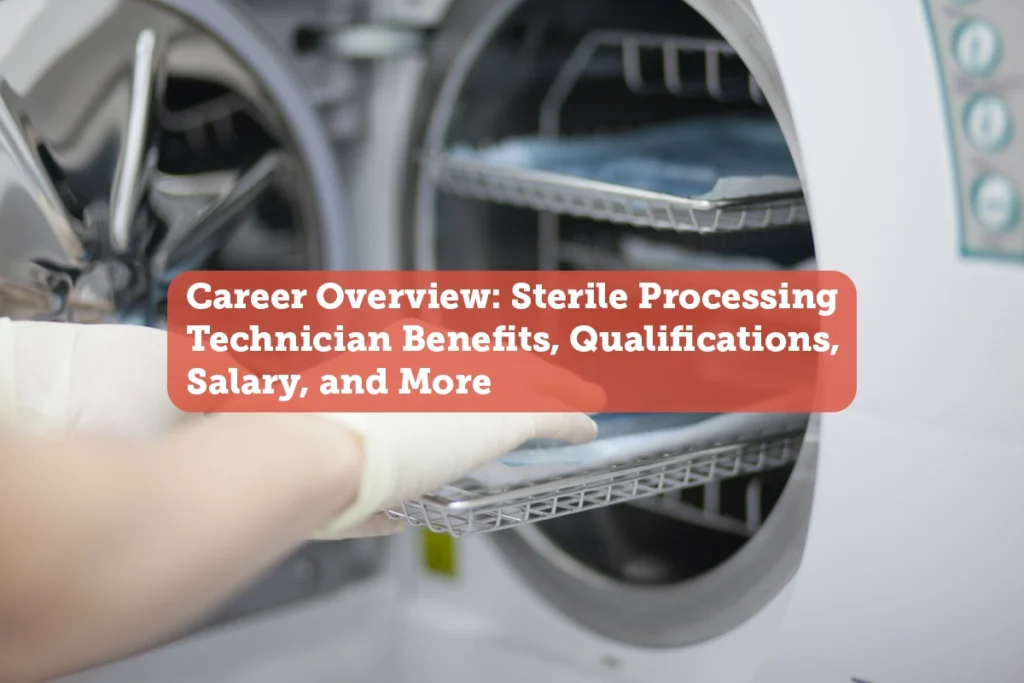Career Overview: Sterile Processing Technician Benefits, Qualifications, Salary, and More
Read to learn more about sterile processing technician jobs
Sterile processing technicians, also known as central processing technicians, play a critical role in ensuring the safety and efficiency of healthcare settings by managing the sterilization of medical instruments and equipment. Their work helps prevent infections and protects both patients and healthcare professionals from potential contamination.
These skilled professionals typically work in hospitals, surgery centers, and clinics, in environments where the need for infection control is paramount. Their tasks include cleaning, disinfecting, and sterilizing medical tools, maintaining proper sterilization records, and ensuring that all instruments are ready for safe use in medical procedures.
The importance of sterile processing technicians cannot be overstated, they are the unsung heroes who ensure that healthcare facilities remain safe and fully operational. In this blog, we will explore the benefits, salary expectations, and other key aspects of a career as a sterile processing technician.

What are the benefits of being an SPD technician?
Being a sterile processing technician comes with a variety of benefits, both professionally and personally. Here are some of the key advantages:
- Job Stability and Security: Healthcare is a rapidly growing field, and sterile processing technicians are in high demand. As long as hospitals, surgical centers, and clinics require medical procedures, the need for properly sterilized equipment will always be crucial, offering a stable and secure career.
- Good Earning Potential: While salaries vary by location and experience, sterile processing technicians can earn a competitive wage. With opportunities for advancement and specialized certifications, technicians can increase their earning potential over time.
- Short Training Period: Compared to many healthcare careers, becoming a sterile processing technician requires less formal education. Most programs take around a year to complete, meaning you can start your career quickly without the need for extensive schooling.
- Opportunities for Advancement: With experience and additional certifications, sterile processing technicians can move into supervisory roles, management, or specialize in particular types of sterilization, offering long-term career growth.
- Hands-on Work Environment: For those who enjoy working with their hands and in a more technical capacity, this job is a perfect fit. Technicians get to work with medical instruments and machinery, and the tasks can be both engaging and intellectually stimulating.
- Work-Life Balance: Many sterile processing technician positions offer regular hours, especially in hospital settings where shifts are scheduled. This can lead to better work-life balance compared to other healthcare positions that may require irregular hours or emergency shifts.
What are the qualifications of a central processing technician?
If you are interested in gaining skills to become a sterile processing tech, you must be 18 or older and have a high school diploma or GED to get started. Some programs may require basic knowledge of science (such as biology or chemistry), so a strong academic background can be helpful.
Any further needed training or education will depend on the specific job you want to pursue. Some sterile processing roles do not require prior experience, while others require certifications and formal training for entry-level positions.
Certifications and training programs
If the role you want to pursue requires certifications and/or training, there are many ways to become certified and qualified to apply to these roles. These programs are typically offered by community colleges, vocational schools, or in online courses. Most programs take around 9 to 12 months to complete, providing classroom instruction and hands-on training.
You’ll study areas like sterilization techniques, infection control, medical terminology, anatomy, and the safe handling of medical equipment. Many programs also include supervised clinical practice to gain experience in a real-world healthcare setting.
Gaining practical experience
Most training programs include internships or clinical hours where you’ll work directly in a hospital or healthcare facility. This allows you to apply the knowledge gained in the classroom and gain valuable hands-on experience.
Some employers also offer on-the-job training to new hires who meet their educational requirements. This allows you to learn the specifics of the employer’s sterilization protocols and systems.
Certifications
Here are some common certifications sterile processing tech jobs require:
CRCST certification
Certified Registered Central Service Technician
- Offered By: International Association of Healthcare Central Service Materiel Management (IAHCSMM)
- The CRCST certification is one of the most common and widely recognized credentials for sterile processing technicians. It covers the essential areas of sterile processing, including sterilization techniques, infection control, decontamination, medical terminology, and anatomy.
Requirements:
- Completion of an IAHCSMM-approved training program, or equivalent experience.
- Successful completion of the CRCST exam.
- A certain number of continuing education units (CEUs) to maintain certification.
Exam:
The exam consists of 150 multiple-choice questions and covers a broad range of sterile processing topics.
CSPDT certification
Certified Sterile Processing and Distribution Technician
- Offered By: Certification Board for Sterile Processing and Distribution (CBSPD)
- The CSPDT certification is another reputable certification, and it’s recognized by many employers. It emphasizes the fundamentals of sterile processing, such as handling and sterilizing medical instruments, infection control, and safety protocols.
Requirements:
- Completion of a training program or on-the-job experience.
- Passing the CSPDT exam.
- Continuing education to maintain certification.
Exam:
The exam includes questions related to sterilization practices, equipment handling, safety, infection prevention, and more.
CSIS certification
Certified Surgical Instrument Specialist
- Offered By: Certification Board for Sterile Processing and Distribution (CBSPD)
- The CSIS certification is designed for those who want to specialize in surgical instrument processing. This certification focuses specifically on the cleaning, sterilization, and maintenance of surgical instruments, making it ideal for those who want to deepen their expertise in that area.
Requirements:
- Experience as a sterile processing technician or completion of a specialized training program.
- Passing the CSIS exam.
- Continuing education for certification renewal.
Exam:
The exam tests knowledge in areas related to surgical instrument handling, maintenance, and sterilization.
CIC certification
Certified Infection Control
- Offered By: Certification Board of Infection Control and Epidemiology (CBIC)
- This certification is more specialized and can be beneficial for sterile processing technicians who want to focus on infection control aspects of their role. It’s ideal for those looking to move into leadership roles, such as infection control officers or infection preventionists.
Requirements:
- Experience in infection control or related healthcare fields.
- Successful completion of the CIC exam.
- Ongoing education to maintain certification.
Exam:
The exam covers infection prevention, sterilization processes, and the overall safety protocols in healthcare settings.
CERT certification
Certified Endoscope Reprocessing Technician
- Offered By: IAHCSMM
- This certification is specifically for technicians who focus on the reprocessing of flexible and rigid endoscopes, which require specialized cleaning and sterilization methods due to their complex design.
Requirements:
- Training and experience in endoscope reprocessing.
- Successful completion of the CERT exam.
Exam:
The exam tests knowledge related to the cleaning, disinfection, and sterilization of endoscopes.
Advanced Certifications to further your career
Certified Healthcare Leader (CHL)
Offered by IAHCSMM, this certification is aimed at sterile processing technicians who are seeking to move into supervisory or managerial roles. It focuses on leadership, management, and healthcare policies.
Management or Supervisory Certifications
For those who want to advance in the field, some employers offer opportunities to take management-focused certification courses or exams that may be recognized by professional organizations like IAHCSMM or CBSPD.
Certification Renewal
Most certifications require renewal every 3–5 years. Renewal often involves completing a certain number of continuing education units (CEUs), which can be earned through workshops, online courses, seminars, or other educational activities related to sterile processing and infection control.
What is the expected salary of sterile processing techs?
Pay and other details about your role are highly specific to location, experience level, certifications, type of facility, and other factors. These are nationwide averages, but may not reflect your expected pay.
Entry level wages can range from $35,000 to $40,000 per year, while more experienced technicians make $55,000 to $60,000 or higher depending on location, the job, certifications, experience level, and other factors.
CRCST, CSPDT, or CSIS certified technicians make a higher salary than those without them. Hospital positions tend to pay higher than other facilities.
Some roles can also come with other benefits like health insurance, retirement plans, and PTO which add additional value to your compensation package.
If you would like to read more about a day in the life of a sterile processing technician, we give a more in-depth view of what to expect in this role!
Looking for a sterile processing technician job?
Hunter Recruiting is the top sterile processing tech staffing agency in Cleveland, and has placed hundreds of professionals into their SPD roles with top healthcare facilities around the United States.
Current SPD job openings:
- Sterile Processing Technician, Cleveland, OH (All Shifts)
- Sterile Processing Technician, Cleveland, OH (2 PM-10:30 PM Shift)
- Sterile Processing Technician, Westlake, OH (2 PM-10:30 PM Shift)
- Lead Sterile Processing Technician, Avon, OH
- Sterile Processing Auditor, Cleveland, OH
- Sterile Processing Manager, Vero Beach, FL
- Sterile Processing Director, Cleveland, OH
You can also visit our job board to see the latest jobs. If you do not see a listing in your area, submit your resume and one of our recruiters will reach out when a position opens!






